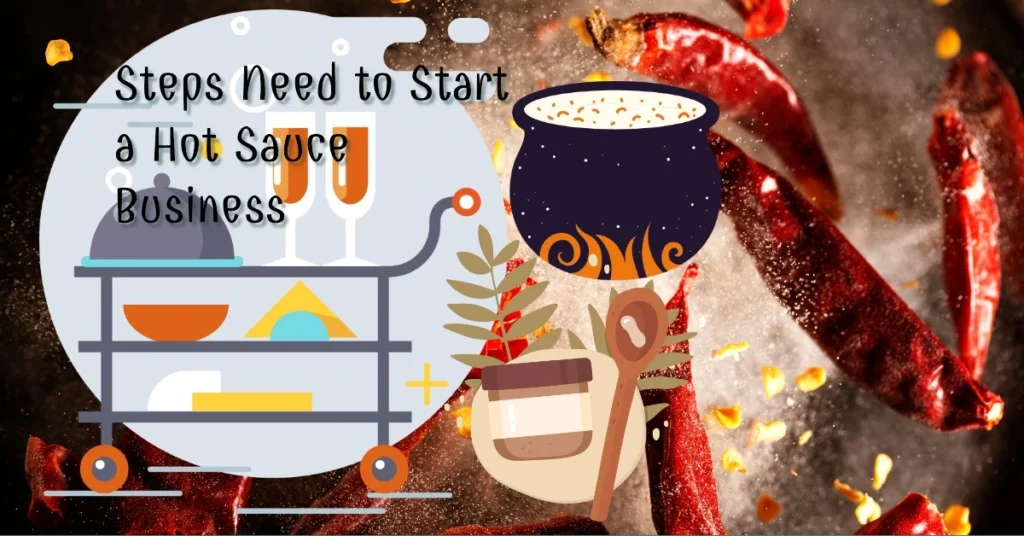Diving into the hot sauce industry is more than a culinary adventure; it’s a journey with fiery passion and potential success. As global tastes evolve, so does the demand for diverse, zesty flavors, presenting a sizzling opportunity for entrepreneurs to start a hot sauce business. This venture, while enticing, requires a strategic blend of creativity, market understanding, and adherence to legal standards.

In this guide, we will elevate the key steps, from cost to start a hot to establishing your hot sauce brand. We will also discuss crucial steps like perfecting your hot sauce flavors, setting up production, obtaining licenses and permits, branding, marketing, and tips for successfully growing a company in the lucrative hot sauce industry.
Whether you want to bottle your signature spicy flavors as a side hobby or launch the next Sriracha empire, this comprehensive beginner’s guide will help bring your spicy dreams to life. From perfecting your recipe to navigating the market’s spicy terrain, we provide a roadmap for aspiring hot sauce moguls. It’s not just about the heat—it’s about igniting a brand that resonates on every shelf.
Why Start a Hot Sauce Business?
The hot sauce market is rapidly expanding as consumer palates evolve to demand more variety, creative flavors, and bolder heat profiles. Starting a hot sauce company allows you to tap into this growth while pursuing your passions.

Beyond financial potential, launching a hot sauce brand lets you creatively express yourself through crafting original recipes. It also lets you connect with similarly fiery-food-loving fans. While developing a successful business takes work, the ability to turn your love of flavors into a thriving, profitable company makes a hot sauce venture deeply rewarding.
The Hot Sauce Market and Its Potential
The global hot sauce market is projected to grow from $2.8 billion in 2022 to $4.1 billion by 2027, expanding at a CAGR of 8% according to Market Data Forecast. Demand is rising across North America, Asia Pacific, and other regions. Within the US specifically, salsa and hot sauce sales grew over 10% from 2020-2021 according to Nielsen data, showing the strength of the domestic market.
Major factors driving growth include increasing consumer interest in bold, innovative flavors and ethnic cuisines along with the health benefits associated with spicy ingredients like peppers. These trends present exciting opportunities for new hot sauce brands.
Start your Own Hot Sauce Business with the Help of These Simple Steps

Selecting Your Hot Sauce Type and Flavors
Crafting the perfect hot sauce starts with carefully selecting styles and flavors that will delight your customers’ taste buds. This crucial step lays the foundation for your entire business.
Researching Market Gaps and Customer Demand
- Market Research: Explore hot sauce industry trends, identifying gaps that your product could fill. Carefully analyze current hot sauce offerings to spot unfilled niches and underrepresented flavors.
- Engage with your Audience: Host interactive taste-testing sessions to gauge reactions to different hot sauce recipes.
- Competitive Analysis: Study the range of hot sauces on the market, noting what works and potential areas of innovation.
- Stay Updated: Attend industry events or join food business networks to keep a pulse on evolving consumer preferences.
- Community Insights: Leverage local market knowledge by partnering with area businesses or culinary experts.
Innovating Distinctive Flavors and Heat Profiles
- Innovate your own unique flavor combinations that complement each other harmoniously while filling a gap in the market.
- Experiment extensively to strike the ideal balance of tastes and spices.
- Develop a spectrum of heat levels to cater to diverse palates, from mild to wildly hot.
- Infuse your sauces with flavors reflecting different culinary heritages, creating a unique, marketable story.
- Consider eco-friendly practices, like organic farming, that resonate with today’s conscious consumers.
- Your distinctive creations should give customers an exciting new flavor experience not easily found elsewhere.
The Critical Role of Recipe Testing and Refinement
- Vigorously test your recipes with diverse tasters and refine them based on feedback before finalizing them for production.
- Making small test batches enables gathering user input to perfect flavors.
- Extensive testing transforms good recipes into phenomenal ones ready for your brand’s launch.
- Experiment with limited-time flavors based on seasonal ingredients or festivities.
- Implement rigorous, standardized testing protocols for every hot sauce batch, maintaining your brand’s reputation.
- Don’t rush this step – numerous iterations using tester feedback can elevate your sauces from great to irresistible.
Developing a Business Plan
Far start a hot sauce business requires more than a passion for spicy flavors. It demands a solid sauce business plan that serves as your roadmap to success.
Understanding the Significance of a Well-Structured Business Plan
- Vision and Direction: It’s your guiding star, keeping your business objectives in check and ensuring your brand doesn’t lose its essence in the hustle.
- Investor Magnet: No savvy investor trusts a business running blind without a plan. It’s your ticket to securing finance, showcasing calculated risks over reckless passion.
- Strategic Marketing: Identify your target audience and how you will reach them, whether through social media or business expos.
- Risk Assessment: Analyze potential obstacles and how you’ll mitigate them, ensuring your business stays hot on the success trail.
- Growth Strategist: Set scalable strategies for expansion, whether entering new markets or launching more sauce varieties.
Choosing the Right Business Structure for Success
- Legal Considerations: Understand the implications of different structures, from sole proprietorship to LLC, for your hot sauce company.
- Tax Implications: Choose a structure that offers tax advantages and complies with business regulations.
- Liability and Risk: Protect your personal assets from business debts and lawsuits by selecting the appropriate legal entity.
- Operational Efficiency: Consider how each structure affects your ability to run and grow your business effectively.
- Future Vision: Select a framework that aligns with your long-term goals, whether staying small or expanding globally.
Efficiently Managing Finances and Operations
- Budget Mastery: Develop a financial plan detailing of business bank account and all costs, from sauce production to marketing, ensuring profitability.
- Cash Flow Management: Implement strategies to maintain healthy cash flow, crucial for your business’s day-to-day operations.
- Inventory Control: Efficiently manage raw materials and finished sauces, balancing cost with demand.
- Quality Assurance: Establish protocols to ensure every bottle of hot sauce meets your brand’s quality standards.
- Operational Agility: Stay adaptable, and ready to pivot strategies based on market trends or operational challenges.
Legal Requirements and Regulations
Navigating licensing, permits, trademarks, and food safety regulations is critical for a compliant business:
- Research federal, state, and local licensing needed. Common requirements include business licenses, business insurance, food handler permits, and specialized food production licenses.
- Federally registered trademarks for your hot sauce business name and brands. State registration provides additional protections.
- Follow CGMP and HACCP principles for sanitary commercial kitchens and manufacturing facilities. Adhere to labeling requirements.
- Acquire Universal Product Code (UPC) barcodes and have products tested by labs to confirm safety.
- Understand laws regarding claims on labels. Avoid unsubstantiated health claims. Provide warnings for food allergens like soy.
Consulting legal advisors ensures full compliance from launch. While regulations involve effort, they ultimately safeguard product quality and consumer safety.
Product Development and Production
Creating distinctive recipes is just the first step. Ensuring a seamless transition from small-batch R&D to mass production strategy for your sauce while maintaining quality requires careful planning.
- Source high-quality, affordable ingredients at scale from reputable suppliers, and secure reliable commercial production equipment.
- Work closely with co-packers and manufacturers to adapt recipes for manufacturing. Account for scaling ratios, equipment differences, food safety protocols, and consistent results.
- Rigorously sample pre-production test batches and conduct shelf-life testing. Tweak recipes if needed before full commercial runs.
- Make contingency plans for order defects, delays, or shortages. Have backup ingredients/equipment suppliers where possible.
Branding and Marketing Your Hot Sauce
Unique branding helps your hot sauce grab customer attention in a crowded marketplace:
- Develop a memorable name and eye-catching logo that reflects your brand identity and story.
- Design engaging bottle labels featuring flavors, imagery, and your brand persona.
- Build social media marketing campaigns highlighting your product’s origins and distinguishing features. Share recipes and videos.
- Pursue earned media publicity with product samples and pitches to high-profile food and hot sauce reviewers.
- Run Google and social media ads targeted to customer demographics with an interest in spicy flavor profiles.
- Attend food festivals, markets, and trade shows to introduce your brand. Offer samples and discounts.
- Seek specialty store and grocer placements through in-person sales meetings. Provide free samples to buyers.
- Partner with distributors to expand retail presence regionally, nationally, or globally. Provide marketing assets and support.
Tips for Growing a Successful Hot Sauce Brand
Sustaining long-term growth requires continuously improving and innovating:
- Monitor sales data and customer feedback to inform new flavor ideas that delight tastes.
- Expand into complementary products like salsa, seasonings, and spice blends leveraging existing brand equity.
- Update packaging and designs periodically to maintain a fresh, current look as your brand scales.
- Invest in search engine optimization and social media engagement to keep attracting new audiences online.
- Consider expanding production capacity, warehousing space, and team staff to match growing demand.
- Hire experienced sales staff to grow accounts with major chains and retailers.
- Explore co-marketing partnerships with complementary brands to cross-promote.
- Implement a CRM system to track customer data and interaction history, enabling personalized engagement.
- If rapid growth exceeds self-funding, explore private equity firms or VC investors who can provide expansion capital.

Conclusion
Starting a successful hot sauce business from scratch requires extensive planning, iteration, and commitment. But for spicy food lovers, the ability to bottle unique flavors and share them with fellow fiery food fans makes the entrepreneurial journey incredibly rewarding.
With strategic recipe development, branding, production planning, marketing, and measured financial and operational management, your homegrown company can thrive. While challenges will arise, embracing solutions with authenticity, grit, and passion will set you up to conquer the hot sauce marketplace.

